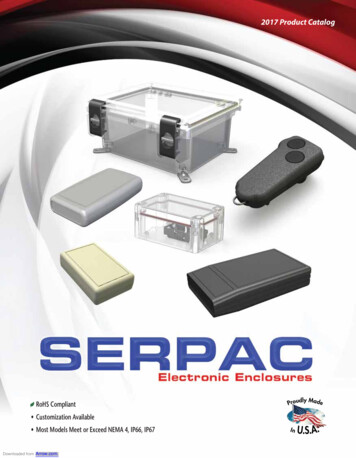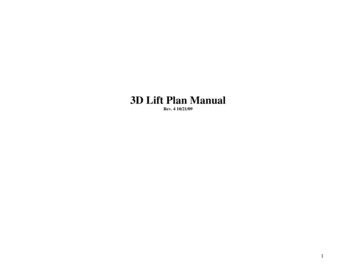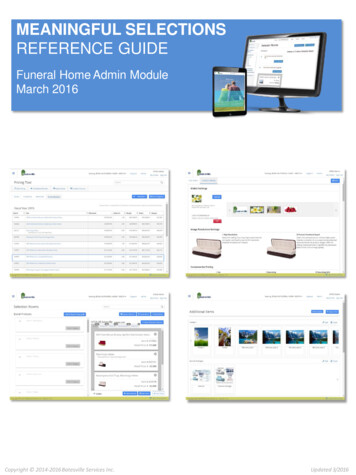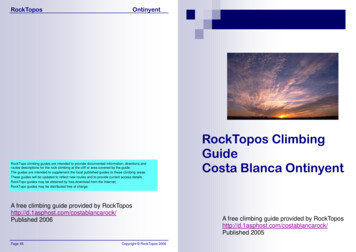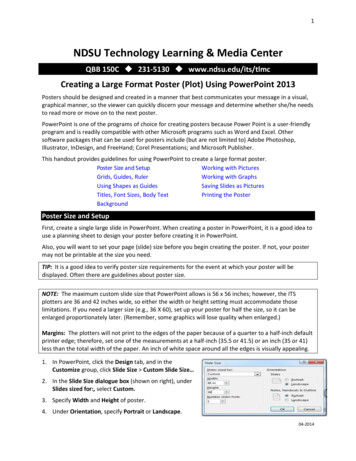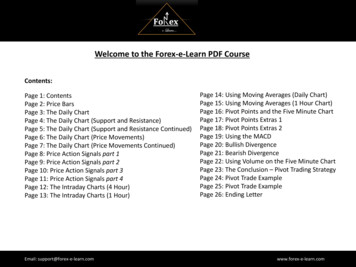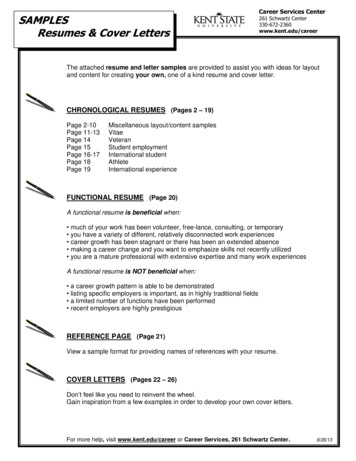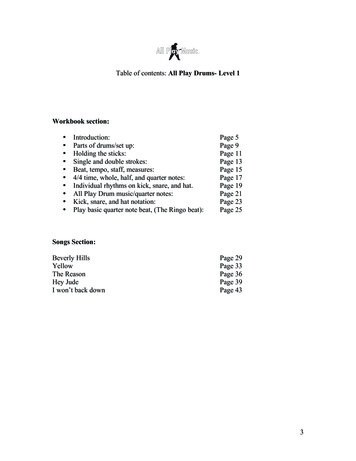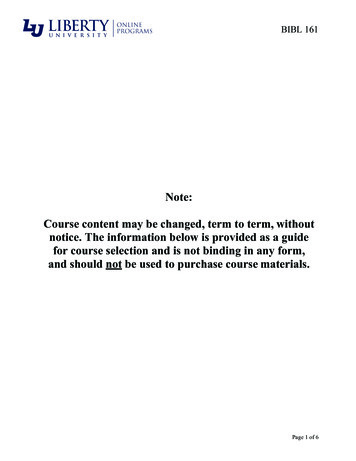
Transcription
BIBL 161Note:Course content may be changed, term to term, withoutnotice. The information below is provided as a guidefor course selection and is not binding in any form,and should not be used to purchase course materials.Page 1 of 6
BIBL 161 Course SyllabusCOURSE SYLLABUSBIBL 161ROMANSCOURSE DESCRIPTIONA thorough consideration of Paul’s theological masterpiece which forms a foundation for understandingthe remaining epistles. Various doctrines that appear in this book will also be examined.RATIONALEWhy study the book of Romans? Romans may be described as the Apostle Paul’s magnum opus. It is asystematic presentation of the Gospel which reveals the righteousness of God. In addition to presentingthe Gospel of Jesus Christ, Paul addresses other significant issues relating to first century A.D.Christianity, including the Jew-Gentile relationship, the Christian’s relationship to the Torah, unity in thechurch, the Christian life, and the Christian’s relationship to government (just to mention a few). Thebook of Romans provides eternal principles that must be applied to contemporary situations. In sum,because of its profound message, its logical presentation of Christian truth (which is foundational to aclear apprehension of the truth imparted in the other Pauline epistles), and because of its propensity toimpact the saved so that their lives will influence the lost for Jesus Christ, it is essential that everyChristian study Paul’s letter to the Romans. The primary purpose of this course is to trace the theme ofGod’s Gospel as presented in the Book of Romans, emphasizing the specific aspect of His revealedrighteousness.I.PREREQUISITEFor information regarding prerequisites for this course, please refer to the AcademicCourse Catalog.II.REQUIRED RESOURCE PURCHASEClick on the following link to view the required resource(s) for the term in which you areregistered: DDITIONAL MATERIALS FOR LEARNINGA.Computer with basic audio/video output equipmentB.Internet access (broadband recommended)C.Microsoft OfficeD.A Study Bible (The questions in the Study Guides and Tests are based on the NIV.)MEASURABLE LEARNING OUTCOMESUpon successful completion of this course, the student will be able to:A.Summarize and interpret the thought of Paul’s letter to the Romans both synthetically andanalytically.Page 2 of 6
BIBL 161 Course SyllabusV.B.Summarize the argument of Romans, tracing Paul’s thought section by section or chapterby chapter.C.Interpret and explain any passage and/or paragraph of Romans from a consistentviewpoint.D.Describe and explain the biblical doctrines of the gospel, condemnation, justification,sanctification, the role of Jews, submission to God, and Christian love.E.Articulate how Romans fits within the framework of salvation history.F.Evaluate the correlation between the theology of Romans and related Second Templeliterature.COURSE REQUIREMENTS AND ASSIGNMENTSA.Textbook readings, Bible readings, and presentationsThe student is expected to read the course textbook by Douglas J. Moo, Romans: TheNIV Application Commentary, in its entirety. The modules/weeks are designed to guidethe student through the textbook and the book of Romans in 8 weeks. In addition toreading the textbook, the student is expected to read through the book of Romans at leasttwice. The student will read Romans along with the textbook. In addition, the student willread through Romans in one sitting. The student may read from the translation of his/herchoice. Several excellent translations exist, including the ESV, HCSB, NIV, NASB,NKJV, and KJV. The student will note that the Study Guides and Tests are based on theNIV (1985) translation.Each module/week contains study guides that are designed to guide the student throughthe book of Romans and the Moo commentary and also to aid in his/her preparation forthe 4 Tests.Page 3 of 6
BIBL 161 Course SyllabusB.Course Requirements ChecklistAfter reading the Course Syllabus and Student Expectations, the student will completethe related checklist found in Module/Week 1.C.Group Discussion Board Forums (3)The student will complete 3 Group Discussion Board Forums. For this collaborativediscussion board, the thread will be posted in response to the instructor’s prompts. Then,the student will reply to 2 classmates’ threads. The student must be acutely aware of thetime sensitivity of the Group Discussion Board Forums. (MLO: A, B, C)D.Research PaperThis is a reading/research-driven course that culminates with a Research Paper. (MLO:A, B, C, D, E)1. Research Paper: TopicThe student will choose a provided topic on which to write his/her Research Paper.2. Research Paper: BibliographyThe student will write a bibliography with a minimum of 10 peer-reviewed, scholarlysources in current Turabian format.3. Research Paper: Thesis StatementThe student will write a clearly written thesis statement for his/her Research Paper.4. Research Paper: Final SubmissionThe student will write a 5-7-page Research Paper based on his/her chosen topic in currentTurabian format.E.Book ReviewA 600-800 word book review that includes four major components: (1) the completebibliographical entry; (2) the author’s information such as education, position, andscholarship; (3) a concise summary or synthesis of the major thrust of the book; and (4)an honest and courteous evaluation of the book. (MLO: F)F.Tests (4)The student is required to complete 4 tests. The tests will be open-book/open-notes andwill consist of 24–25 multiple-choice, true/false, and/or essay questions. The tests coverall required Reading & Study material. The student will have 1 hour to complete eachtest. (MLO: A, D)Page 4 of 6
BIBL 161 Course SyllabusVI.COURSE GRADING AND POLICIESA.PointsCourse Requirements ChecklistGroup Discussion Board Forum (3 at 100 pts ea)Research PaperTopicBibliographyThesis StatementFinal SubmissionBook ReviewTests (4 at 100 pts ea)10300TotalB.1030101501004001010ScaleA 900–1010 B 800–899 C 700–799 D 600–699 F 0–599C.Disability AssistanceStudents with a documented disability may contact Liberty University Online’s Office ofDisability Academic Support (ODAS) at LUOODAS@liberty.edu to make arrangementsfor academic accommodations. Further information can be found atwww.liberty.edu/disabilitysupport.Page 5 of 6
BIBL 161 Course SyllabusCOURSE SCHEDULEBIBL 161Textbook:Moo, The NIV Application Commentary: Romans (2000).MODULE/WEEKREADING & STUDY1Moo: pp. 15–57Romans 1:1–1:171 presentationCourse Requirements ChecklistClass IntroductionsGroup DB Forum 11001002Moo: pp. 58–124Romans 1:18–3:201 presentationResearch Paper: TopicTest 1101003Moo: pp. 125–167Romans 3:21–4:251 presentationGroup DB Forum 2Research Paper: Bibliography100304Moo: pp. 168–216Romans 5:1–6:231 presentationTest 21005Moo: pp. 217–289Romans 7:1–8:391 presentationGroup DB Forum 3Research Paper: Thesis Statement100106Moo: pp. 290–392Romans 9:1–11:361 presentationTest 31007Moo: pp. 393–483Romans 12:1–15:131 presentationChristian Worldview Essay1008Moo: pp. 484–516Romans 15:14–16:271 presentationResearch Paper: Final SubmissionTest 4150100TOTAL1010ASSIGNMENTSPOINTSDB Discussion BoardNOTE: Each course module/week (except Module/Week 1) begins on Tuesday morning at 12:00 a.m.(ET) and ends on Monday night at 11:59 p.m. (ET). The final module/week ends at 11:59 p.m.(ET) on Friday.Page 6 of 6
The student will note that the Study Guides and Tests are based on the NIV (1985) translation. Each module/week contains study guides that a



